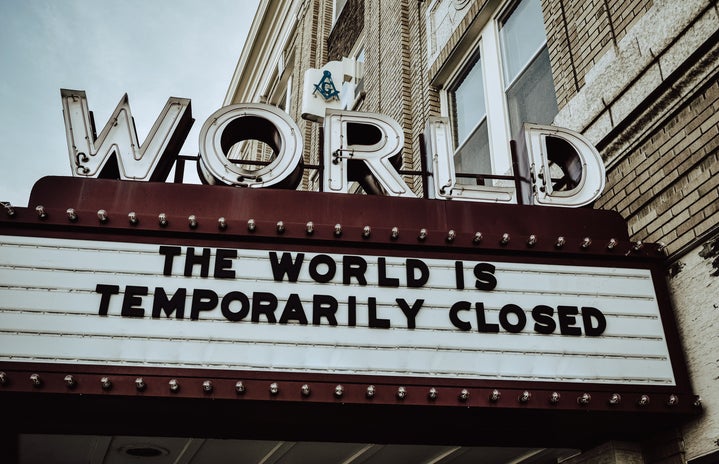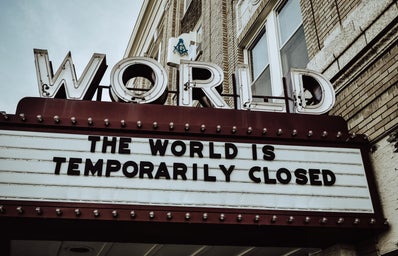Edited By: Laura Sweet
When Christopher Nolan announced, back in mid-2020, that his most recent film, Tenet, would be reserved for a theatrical-only release, his decree was met with equal levels of shock, scorn, praise, and outrage.
Some believed this decision was premature. Others claimed he was ahead of his time. Regardless, one thing is for certain—
The situation that prompted this choice was unprecedented, unlike anything that’d come before.
And, from this moment on, modern-day theatregoing would never be the same.
audiences, energy, and the safety of the screen
The situation in question is, of course, the continued threat of the SARS-CoV-2 pandemic. The ongoing, airborne illness that still plagues our waking world, casting doubt upon the futures of our students, leaders, lives—and entertainment venues.
When the virus first swept the international stage, theatres were the first to go dark. After all, sitting in a dark, tightly-packed space, shoulders pressed to those of your seat neighbours’, coughs and drink-slurps adding to the ambience—with the advent of the disease, it was simply a nightmare waiting to happen. And so, films were pulled, marquees dimmed, popcorn growing stale behind the counter.
Four months, there were, between the shutdown and the theatrical resurgence. Four months, of Netflix binges and re-runs, of comfort films and blockbuster delays.
And then, on August 26th, came Tenet.
(A film I’ve read so much about, yet still, somehow, have never seen).
To some regard, Nolan’s insistence was understandable. After all, in his words, this film was “designed for the audience experience…the big screen experience.” From sound design to cinematography, it had been specifically shot to be enjoyed in a darkened auditorium, echoes thrumming above a vibrant crowd.
Still, though we didn’t know it then, we were barely a third into the pandemic. Infection rates were high, and though theatres gradually opened—perhaps, in part, due to Tenet’s impending release—most still avoided them, fearing whether a mask would protect them from the strangers at their sides.
(Ah. I suppose that’s why I never went to see it).
Theatre-going in the midst of the pandemic is a far cry to what it was before the storm. I can still recall the sheer electricity coursing through the crowd on Avengers: Endgame (2019)’s opening weekend, the sobs echoing around me at the end of that same year’s Little Women.
Yet though I’ve managed to work up the nerve, made time to see some films during this theatrical reopening… that palpable energy seems to have completely fizzed out. The box seats have become vacant, deserted; even full-capacity screenings have dwindled to a ghost town.
Theatres, it seems, have begun fading to obscurity.
And box office records only corroborate the evidence.
changing tides, changing times
Pre-pandemic, theatrical revenue had just reached an all-time high: in fact, eight separate 2019 releases had skyrocketed to become some of the highest-grossing films of all time, each one bringing in billions of international revenue. Trailers were breaking the internet. Ticket lines were packed. Even local film festivals sold out the majority of their screenings.
Post-pandemic, the highest-grossing American film was the aforementioned Tenet, barely able to crack the $365 million mark.
Pretty bleak.
It quickly became evident that most non-cinephiles weren’t willing to risk their lives for a couple hours of entertainment—not, of course, for films that would be on their handheld streams in but a month or two, thanks to the shortened 45-day window that’s become commonplace for new releases. Craving legitimate movie-theatre popcorn? You can UberEats it. Missing the pre-show trailers? YouTube houses them all. The only hesitation I’ve encountered is in terms of spoilers—and those are easily enough avoided, with a simple Twitter mute keystroke.
This preference, of course, is completely understandable: the virus carries an inherent risk, and everyone has different comfort levels. Putting it that way, the ‘home theatre’ option sure sounds fairly appealing.
And, so, that became the new normal for a while. Movie buffs, Bond- and Marvel-die-hards, they traversed to theatres—but casual viewers? They elected to stay home.
They waited. And that was that.
Or so it seemed.
And then… came Spider-Man: No Way Home.
The return of the modern blockbuster
From the get-go, this title was bound to be a crowd-pleaser. Its direct predecessor, 2019’s Spider-Man: Far From Home, topped $1.1 billion at the box office during its initial release, and the cliffhanger it left off on was prime set-up for a gripping story.
Add in the castings, the set leaks, the rumours growing by the day—for over a year, it had generated buzz. A deafening one, in fact.
Still, reporters, critics, even actors themselves doubted that the film could reach its $250 million opening-weekend projection.
But, reach it, it did—then surpassed it, too.
By the end of its first weekend, it had broken the record for the second-biggest opening weekend of all time, surpassing 2018’s Infinity War event. Not even two weeks later, it had crashed into the top-10 domestic box office lists.
Today, it’s the sixth highest-grossing film of all time.
This paints a compelling picture—and a complicated one. You see, Spider-Man: No Way Home didn’t even open at an opportune time; no, it swung into cinemas but a week after the rapidly-spreading Omicron variant swept across the nation. My local theatre shut down but three days after the film’s initial opening. I, personally, was hesitant to brave the enclosed theatre, and opted instead to see it from the safety of a drive-in.
It pulled these numbers nonetheless.
The problem, then, must not be that people are afraid to see a movie during the pandemic—in terms of case counts and infection rates, Spider-Man: No Way Home made for a more risky viewing experience than November’s Eternals or the late-summer Shang-Chi and the Legend of the Ten Rings (two films that pulled in but a fraction of the profit).
No, the problem must not be the threat of the pandemic.
The deciding factor, instead, must lie in what one is willing to make the trip for.
And that, then, is not so much a pandemic-inflicted issue as it is an internal reflection. A zeitgeist, forced to arise prematurely, betraying what audiences have been shaped (over the past two years) to feel.
For if audiences are hesitant to see even a lesser-known Marvel hero grace the silver screen, regardless of rave critical reviews, then how will they fill seats for an auteur arthouse film, or an indie drama? Are souls brave enough to brave a horror? What of anything micro-budget? Non-IP? Festival fare? Is this pattern brought on by the pandemic, or will it continue in the long run?
Of course, event films are fun! Blockbusters have always drawn the largest crowds, and watching the culmination of months and years of stories compact into a single, epic moment is incomparable. Spider-Man: No Way Home achieved these cinematic landmarks for a reason—and rightfully so! It’s a fantastic movie: a rollercoaster of emotion, a nostalgia-filled romp of fierce action and euphoric thrills. In fact, the third act contains two of the most joy-inducing moments I’ve ever seen on the big screen.
But if audiences are only interested in seeing these event films, while opting to skip out on titles by the likes of directorial-legend Spielberg and Oscar-winning Zhao… what does it mean for the future of the theatrical experience?
looking to a (brighter) future
It’s a tad of a loaded question, one that may not be answered until this latest viral wave passes us by. Will we ever return to the vibrant palpability of an opening-weekend crowd, a theatre packed to the brim with bright-eyed moviegoers?
I sure hope so—after all, I’ve spent many a birthday filling theatres with my friends, and some of my most cherished memories take place either at TIFF or at my local Cineplex. And so, I intend to hold onto this hope, and look forward to the day upon which the theatre, once again, becomes my second home. Still, it will be interesting to see what happens as the variants begin to fade, and the world starts to shift back to a ‘new normal’.
Until then, I suppose, I’ll re-watch the latest Super Bowl trailers, and daydream of the next time that I’ll travel to the theatre—because there’s no shortage of unbelievable films lined up for the remainder of 2022.


